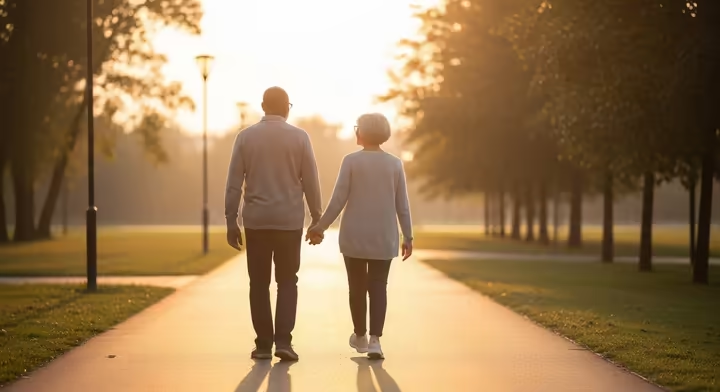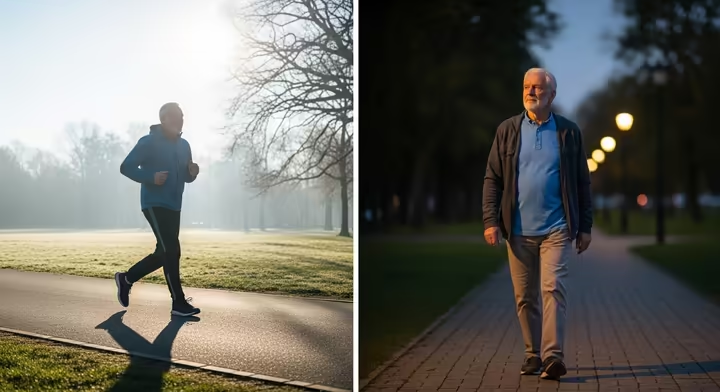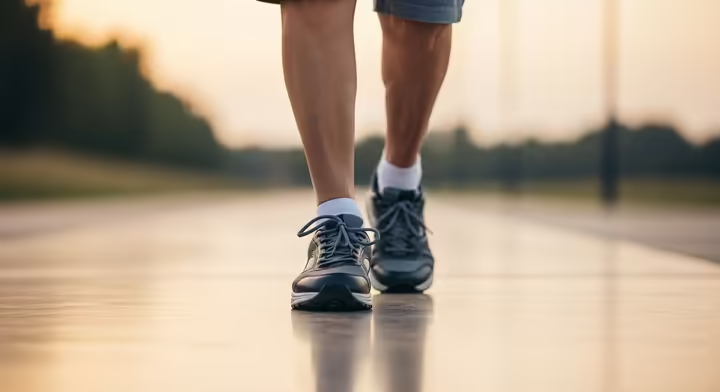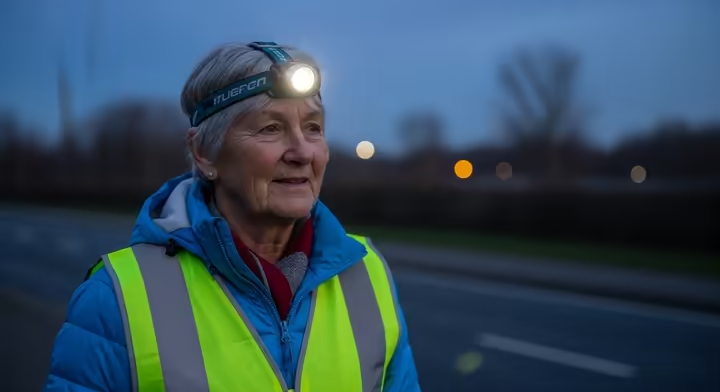Evidence-Based Benefits of Evening Walks for Seniors
This guide details the health benefits of evening walks for older adults. It covers how timing affects digestion, stress, and sleep, and compares evening walks to morning exercise. The guide also provides safety protocols and recommendations for specific health conditions.

Physiological and Psychological Benefits of Evening Walks
A walk between 5 p.m. and 9 p.m. provides distinct physiological and psychological benefits for older adults. These advantages are linked to the body's natural daily rhythms. An evening walk can aid digestion, reduce mental stress, and prepare the body for sleep.
Post-Meal Digestive and Metabolic Support
Walking after the evening meal aids gastrointestinal function. The physical motion stimulates peristalsis, the muscle contractions that move food through the digestive tract. This can help prevent bloating, indigestion, and acid reflux. 2
A post-dinner walk also provides metabolic benefits by helping to manage blood glucose levels. After a meal, skeletal muscles use glucose from the bloodstream for energy, a process facilitated by the GLUT-4 transporter. 3 This lowers circulating blood sugar, reduces the post-meal spike, and improves glycemic control. 1
Mental Decompression and Stress Reduction
An evening walk can reduce stress, anxiety, and symptoms of depression. 4 It creates a transition between the day's activities and nighttime rest. This provides an opportunity to unwind and clear the mind. 2

The walk's stress-reducing effect is physiological, relating to the hormone cortisol. Cortisol levels naturally decline throughout the day, but stress can keep them elevated into the evening, which interferes with sleep-promoting melatonin. 10 A gentle evening walk helps lower cortisol levels. 11
This process allows melatonin to work more effectively. It shifts the autonomic nervous system from the sympathetic "fight-or-flight" mode to the parasympathetic "rest-and-digest" mode. This creates a better hormonal and neurological environment for sleep. 12
Social Connection and Consistency
Evening walks also offer social advantages that support long-term consistency. The evening is often a flexible time to walk with a spouse, family members, or friends. 13 Walking with a companion provides motivation and accountability, increasing the likelihood of regular exercise. 4
Comparing Morning and Evening Walks
The best time to walk depends on your specific health goals, needs, and lifestyle. Both morning and evening walks have distinct, evidence-based advantages. Understanding these differences allows you to choose the schedule that benefits you most.

Metabolism and Blood Sugar Regulation
The time of day you walk affects weight management and blood glucose control differently.
Morning walks are useful for weight management. Exercising before breakfast encourages the body to use stored fat for energy, as blood sugar and insulin levels are low. 14 A morning walk can also boost metabolic rate for several hours, increasing total daily calorie burn. 15
Evening walks are more effective for managing blood sugar after meals, a critical goal for those with or at risk for type 2 diabetes. 7 A walk after the evening meal counteracts the rise in glucose, as muscles pull it from the bloodstream for fuel. 1 Research found that three 15-minute walks after meals were more effective for 24-hour glycemic control than a single 45-minute walk, with the post-dinner walk being most effective at lowering hyperglycemia. 3
Sleep Quality and Circadian Rhythms
Both morning and evening walks can improve sleep through different mechanisms.
Morning walks improve sleep by reinforcing the body's circadian clock. Exposure to natural sunlight early in the day signals the brain to suppress melatonin, promoting alertness. 17 This helps regulate the release of melatonin in the evening, leading to better sleep quality. 12
Evening walks aid sleep onset by regulating core body temperature. Physical activity temporarily raises body temperature, and the subsequent decline signals the brain that it is time to sleep. 22 This cooling effect can shorten the time it takes to fall asleep. 24
Flexibility, Injury Risk, and Performance
The condition of your muscles and joints changes throughout the day, affecting comfort and injury risk.
In the morning , many older adults, especially those with osteoarthritis, experience joint stiffness. 26 Core body temperature is at its lowest, and muscles are less pliable. This can make walking feel more difficult and may increase injury risk without a proper warm-up. 2
In contrast, the evening is often better for physical activity. Core body temperature, muscle strength, and flexibility typically peak in the late afternoon. 14 This can make walking feel easier, improve performance, and reduce injury risk, especially for those with osteoarthritis. 26
Consistency and Habit Formation
The effectiveness of any exercise program depends on consistency.
A morning walk can be effective for building a consistent habit. Exercising first thing in the day means fewer distractions or responsibilities can interfere. 15 Some research suggests morning exercise is better for long-term habit formation. 34
An evening walk may be more practical for those with flexible evenings or who dislike early exercise. Cooler temperatures in warm climates can make evening walks more pleasant. The social aspect of walking with others can also boost motivation and consistency. 2
| Feature | Morning Walk (approx. 6 a.m. - 10 a.m.) | Evening Walk (approx. 5 p.m. - 9 p.m.) |
|---|---|---|
| Primary Metabolic Goal | Weight Management: Enhances fat oxidation (if fasted); boosts metabolism for the day. 15 | Blood Sugar Control: More effective for reducing post-dinner glucose spikes and improving insulin sensitivity. 1 |
| Primary Sleep Goal | Circadian Rhythm Support: Early light exposure helps set the body's 24-hour clock. 12 | Aids Sleep Onset: Post-exercise drop in core body temperature promotes sleepiness and reduces time to fall asleep. 22 |
| Musculoskeletal State | Higher Injury Risk: Body is often stiffer and colder; requires a more extensive warm-up. 26 | Lower Injury Risk: Muscles and joints are naturally warmer and more flexible; ideal for those with arthritis. 14 |
| Psychological State | Energy Boost: Can increase alertness and set a positive tone for the day. 2 | Stress Reduction: Ideal for mental decompression after a full day; helps lower evening cortisol levels. 7 |
| Adherence Factors | Habit Formation: Fewer daily interruptions; may be easier to build into a consistent routine. 34 | Flexibility & Social: Fits more flexible schedules; easier to walk with others; more pleasant in hot climates. 2 |
Walks for Specific Health Conditions
A daily walk can help manage several chronic health conditions. Evening walks, in particular, offer benefits for individuals with type 2 diabetes, osteoarthritis, hypertension, and cognitive concerns.
Type 2 Diabetes
A post-dinner walk is an effective lifestyle choice for older adults managing type 2 diabetes. Its main benefit is reducing high blood sugar after a meal. 6 A walk after eating helps lower peak glucose levels as contracting muscles use glucose from the blood. 3
Walks as short as 10 to 15 minutes after a meal are effective at reducing glucose spikes. 18 This practice improves both immediate blood sugar control and long-term insulin sensitivity. 6 The main precaution for those on certain medications is the risk of nocturnal hypoglycemia, which requires careful monitoring. 36
Osteoarthritis (OA)
People with osteoarthritis (OA) often experience the most pain and stiffness in the morning. 26 This makes evening a better time for physical activity. In the evening, higher body temperature makes muscles and joints more flexible. 14

Exercising when the body is more prepared can reduce pain associated with OA. 38 Regular walking strengthens the muscles supporting the knee and hip joints, which offloads pressure. 39 The motion also helps circulate synovial fluid, delivering nutrients to cartilage. 39
Long-term studies indicate that older adults with knee OA who consistently walk more steps per day are better able to maintain their physical function over time. 26
Hypertension
While regular physical activity helps manage hypertension, research suggests evening exercise may be more effective for blood pressure control. 42 Several studies found that evening aerobic exercise reduces systolic and diastolic blood pressure more than morning exercise. 42 One reason may be that arteries are more elastic in the evening. 30
The blood pressure-lowering effect, known as post-exercise hypotension, can last for several hours. An evening walk may help lower blood pressure overnight and reduce the sharp rise that occurs in the morning. 30 However, individuals with uncontrolled high blood pressure should consult their physician before starting an exercise program. 44
Mild Cognitive Impairment (MCI) and Dementia Risk
Regular physical activity helps protect brain health and reduces the risk of cognitive decline, MCI, and dementia. 46 While research on the ideal timing is ongoing, evening walks support brain health through several indirect mechanisms.
Improved sleep from evening walks is vital for cognitive function, as the brain consolidates memories and clears metabolic waste during sleep. 23 The walk's stress-reducing properties are also neuroprotective, as chronic stress can harm brain structures involved in memory. 12 A daily walk's routine can also reduce anxiety and agitation for those with existing cognitive conditions. 49
An evening walk can help manage multiple chronic conditions at once. For example, a person with both type 2 diabetes and osteoarthritis can use a post-dinner walk to manage blood sugar when their joints are most flexible. This makes the activity both efficient and sustainable.
Practical Guidance and Safety Protocols
These recommendations cover how to implement a walking routine, prepare properly, and stay safe in low-light conditions.
Walk Implementation: Duration, Intensity, and Frequency
- Duration: If you have been sedentary, start with 10 to 15-minute sessions and increase the duration gradually. 26 Aim for at least 150 minutes of moderate-intensity aerobic activity per week, which can be broken into shorter walks. 51 For post-meal blood sugar control, walks as short as 10 to 15 minutes are effective. 18
- Intensity: Aim for a moderate intensity. You should be able to carry on a conversation but not have enough breath to sing. 11 This typically corresponds to a brisk walk at 3 to 4 mph or a cadence of about 100 to 102 steps per minute. 55, 57
- Frequency: Consistency is key. Aim to walk on most days of the week, with no more than two consecutive days off. 1 This regular activity is necessary for long-term health improvements.
Essential Gear and Preparation
- Footwear: Wear supportive, well-fitting shoes that provide good cushioning to reduce stress on joints. 2 Flexible shoes that allow natural foot motion may be preferable for those with knee osteoarthritis. 39
- Terrain: Choose smooth, level, and well-maintained surfaces like paved sidewalks or school tracks. 26 Avoid uneven pavement, cracks, or other tripping hazards.
- Hydration and Weather: Drink water before and after your walk. 60 Dress in layers that can be removed as your body warms up. 60
Safety in Low-Light Conditions
Walking in the evening requires extra attention to safety due to reduced visibility. A safe approach includes three key components: personal visibility, route selection, and situational awareness.

-
Personal Visibility (Being Seen):
- Wear light-colored or bright clothing. 60
- Incorporate retroreflective materials on clothing, shoes, or a vest so you are visible to drivers. 59
- Carry a flashlight or wear a headlamp to illuminate your path and make you more noticeable. 59
-
Route Selection (Where You Walk):
- Stick to familiar, well-lit paths. 26
- Use sidewalks. If you must walk on the road, walk facing oncoming traffic, as far from the lane as possible. 59
- Plan your route to avoid busy intersections or roads with high speed limits. 62
-
Situational Awareness (How You Walk):
- Stay alert. Keep the volume low if listening to audio so you can hear approaching traffic. 60
- Be cautious at intersections and driveways, and make eye contact with drivers before crossing. 59
- Walk with a companion if possible. Inform someone of your route and return time, and carry a charged phone and identification. 13, 60
Potential Drawbacks and Mitigation
It is important to understand the potential risks of evening walks and how to manage them effectively.
Risk of Nocturnal Hypoglycemia (for Diabetics)
- The Risk: For individuals with diabetes who use insulin or certain oral medications, exercise can pose a risk. The blood sugar-lowering effect can persist for hours, potentially leading to low blood sugar during the night (nocturnal hypoglycemia). 36 Symptoms can include waking with a headache, nightmares, or night sweats. 36
-
Mitigation Strategies:
- Monitor Glucose: Check blood glucose levels before an evening walk and again before bed. Consult your healthcare provider for personalized target ranges. 19
- Adjust Fueling: If blood sugar is low before bed, a small snack with carbohydrates and protein can help stabilize levels overnight. 36
- Consult on Medication: Talk to your doctor or diabetes educator about adjusting medication dosages on days you walk in the evening. 36
- Be Prepared: Keep a source of fast-acting carbohydrates, like glucose tablets or juice, at your bedside. 36
Sleep Disruption from High-Intensity or Late-Night Exercise
- The Risk: While a gentle evening walk aids sleep, a walk that is too vigorous or too close to bedtime (within one to two hours) can interfere with it. 22
- The Mechanisms: A gentle walk causes a mild rise in core body temperature, and the subsequent cooling promotes sleep. 22 In contrast, strenuous exercise causes a sharp and sustained increase in core body temperature, which is a wake-up signal. High-intensity workouts also increase stimulating hormones like cortisol and adrenaline, which is counterproductive to sleep. 10
-
Mitigation Strategies:
- Time Your Walk: Finish your walk at least two hours before bedtime to allow body temperature and hormone levels to decline. 22
- Control Intensity: Keep a moderate pace where you can comfortably hold a conversation. The goal is gentle movement, not athletic training. 67
- Pay Attention to Your Body: If evening walks leave you feeling energized, try walking earlier or reducing the intensity. 22
Visibility and Environmental Hazards
- The Risk: Reduced visibility after sunset increases the risk of not being seen by drivers and of tripping on unseen obstacles. 59 Age-related changes in vision and balance can increase this risk. 59
- Mitigation Strategies: This risk is managed by focusing on personal visibility (reflective gear, lights), careful route selection (well-lit, familiar paths), and constant situational awareness as previously described. 59
Current Research and Future Directions
The recommendations in this guide are based on evidence from gerontology, exercise science, and chronobiology. While current knowledge is strong, research is ongoing, and some gaps remain.
Grounding in Evidence
The benefits of evening walks are well-supported by research. Studies show post-meal walking is highly effective for glycemic control in older adults. 3 Other research links evening exercise to greater cardiovascular benefits and improved sleep parameters, such as the time it takes to fall asleep. 24, 42
Identifying Gaps in the Literature
Despite this evidence, more research is needed, especially for the most vulnerable older adults. Key areas for future investigation include:
- Frail and Very Old Populations: Most research has been done on healthy older adults, and it is unclear how these findings apply to those who are frail or over 85, as they may have different physiological responses to exercise. 68
- Cognitive Impact of Timing: There is little research on whether the timing of a walk affects cognitive outcomes in seniors. 46 Future studies could explore if evening walks offer a greater long-term benefit for memory due to their effect on sleep.
- Long-Term Adherence in Seniors: More long-term trials are needed to compare adherence rates for morning versus evening walking programs in retired populations. 71
- Long-Term Musculoskeletal Adaptation: Long-term research is needed to quantify if walking in the evening leads to a measurable reduction in injury rates or slower progression of joint damage for those with osteoarthritis. 72
Future Directions
Future research should focus on closing these gaps. Wearable sensors can collect real-world data on activity, sleep, and physiological variables in large groups of older adults, improving on lab-based studies. 68
Future studies should also test interventions that combine timed exercise with other circadian cues, like light exposure and meal timing. 25 The goal is to develop personalized exercise timing recommendations based on an individual's chronotype, genetics, and health conditions.
Works cited
- The Incredible Power of a Post-Meal Walk - SilverSneakers, https://www.silversneakers.com/blog/the-incredible-power-of-a-post-meal-walk-2/
- Walking in morning vs walking during evening hours: Which is better? - Times of India, https://timesofindia.indiatimes.com/life-style/health-fitness/health-news/walking-in-morning-vs-walking-during-evening-hours-which-is-better/articleshow/110811551.cms
- Walking After Meals: Small Habit, Big Metabolic Gains - News-Medical.net, https://www.news-medical.net/health/Walking-After-Meals-Small-Habit-Big-Metabolic-Gains.aspx
- How Walking Can Benefit Your Mental Health - WebMD, https://www.webmd.com/fitness-exercise/mental-benefits-of-walking
- Mental Health Benefits From Walking - American Behavioral Clinics, https://americanbehavioralclinics.com/mental-health-benefits-from-walking/
- Walking when you have diabetes | Exercise | Diabetes UK, https://www.diabetes.org.uk/living-with-diabetes/exercise/walking-with-diabetes
- The Best Time of Day to Walk for Maximum Health Benefits, https://www.verywellhealth.com/when-is-the-best-time-to-walk-11750326
- A Sleep Doctor Explains How to Fix Your Cortisol and Sleep - Rise Science, https://www.risescience.com/blog/cortisol-and-sleep
- Chronobiology and Age-Related Diseases - Number Analytics, https://www.numberanalytics.com/blog/chronobiology-age-related-diseases-guide
- The Best Walking Plan to Help You Reduce Stress - EatingWell, https://www.eatingwell.com/article/8024858/walking-plan-to-reduce-stress/
- The power of walking: steps to better health | News, https://news.llu.edu/health-wellness/power-of-walking-steps-better-health
- Walking for 15 minutes a day can change your whole nervous system - TCTEC® Innovation, https://tctecinnovation.com/blogs/daily-blog/walking-for-15-minutes-a-day-can-change-your-whole-nervous-system
- Walking - the benefits for older people | Better Health Channel, https://www.betterhealth.vic.gov.au/health/healthyliving/Walking-the-benefits-for-older-people
- Morning walk vs evening run: What's best for your heart? - The Times of India, https://timesofindia.indiatimes.com/life-style/health-fitness/health-news/morning-walk-vs-evening-run-whats-best-for-your-heart/articleshow/118482274.cms
- Morning vs Evening Walk: Which one is more efficient for weight loss - The Times of India, https://timesofindia.indiatimes.com/life-style/health-fitness/morning-vs-evening-walk-which-one-is-more-efficient-for-weight-loss/articleshow/121643340.cms
- Best time to walk: Morning vs evening, before or after meals; what really works?, https://m.economictimes.com/news/new-updates/best-time-to-walk-morning-vs-evening-before-or-after-meals-what-really-works/what-is-better-morning-or-evening-walk/slideshow/122418535.cms
- Morning walk vs evening walk: Which is better for weight loss? - Metabolism Boost, https://m.economictimes.com/news/india/morning-walk-vs-evening-walk-which-is-better-for-weight-loss/metabolism-boost/slideshow/121435966.cms
- Short walks after meals deliver big benefits for blood glucose, https://www.news-medical.net/news/20250703/Short-walks-after-meals-deliver-big-benefits-for-blood-glucose.aspx
- How Walking After Eating Impacts Your Blood Sugar - Cleveland Clinic Health Essentials, https://health.clevelandclinic.org/walking-after-eating
- Three 15-min bouts of moderate postmeal walking significantly ..., https://pubmed.ncbi.nlm.nih.gov/23761134/
- How Age Affects Your Circadian Rhythm - Sleep Foundation, https://www.sleepfoundation.org/circadian-rhythm/how-age-affects-your-circadian-rhythm
- Exercising for Better Sleep | Johns Hopkins Medicine, https://www.hopkinsmedicine.org/health/wellness-and-prevention/exercising-for-better-sleep
- Exercise and Insomnia - Sleep Foundation, https://www.sleepfoundation.org/insomnia/exercise-and-insomnia
- (PDF) Effects of Morning Versus Evening Home-Based Exercise on Subjective and Objective Sleep Parameters in Older Adults: A Randomized Controlled Trial - ResearchGate, https://www.researchgate.net/publication/341524543_Effects_of_Morning_Versus_Evening_Home-Based_Exercise_on_Subjective_and_Objective_Sleep_Parameters_in_Older_Adults_A_Randomized_Controlled_Trial
- Light Exposure and Ageing: Key Circadian Effects - Decode Age, https://decodeage.com/blogs/biohacking/light-exposure-and-ageing-key-circadian-effects
- Start Your Own Walking Program for OA - WebMD, https://www.webmd.com/osteoarthritis/oa-start-walking-program
- Best Stretches for Arthritis Morning Stiffness - WebMD, https://www.webmd.com/osteoarthritis/best-stretches
- 8 Early Signs of Arthritis You Should Never Ignore - AARP, https://www.aarp.org/health/conditions-treatments/arthritis-symptoms/
- Circadian variation in sports performance - PubMed, https://pubmed.ncbi.nlm.nih.gov/8726347/
- Morning vs. evening workouts: Which is better for heart health? | HCA HealthONE, https://www.healthonecares.com/healthy-living/blog/morning-vs-evening-workouts-which-is-better-for-heart-health
- Morning vs. evening workouts: Which is better for heart health? | Sunrise Health System, https://www.sunrisehealthinfo.com/healthy-living/blog/morning-vs-evening-workouts-which-is-better-for-heart-health
- The Pros And Cons Of Morning And Evening Exercise A Review Article - IOSR Journal, https://www.iosrjournals.org/iosr-jdms/papers/Vol19-issue12/Series-14/A1912140107.pdf
- The Proper Time to Exercise: When Should Older Adults Work Out? | VIPcare, https://getvipcare.com/blog/when-is-the-best-time-to-exercise-for-older-adults/
- Consistent Morning Exercise May Be Beneficial For Individuals with Obesity - PMC, https://pmc.ncbi.nlm.nih.gov/articles/PMC7492403/
- The Benefits of Walking When You Have Diabetes | My Doctor Online, https://mydoctor.kaiserpermanente.org/ncal/article/the-benefits-of-walking-when-you-have-diabetes-1904738
- Avoiding Nighttime Hypoglycemia - Joslin Diabetes Center, https://joslin.org/news-stories/all-news-stories/education/2020/03/avoiding-nighttime-hypoglycemia
- Diabetes and exercise: When to monitor your blood sugar - Mayo Clinic, https://www.mayoclinic.org/diseases-conditions/diabetes/in-depth/diabetes-and-exercise/art-20045697
- Top tips for walking with arthritis, https://versusarthritis.org/news/2024/march/top-tips-for-walking-with-arthritis/
- 5 Walking Strategies - Arthritis Foundation, https://www.arthritis.org/health-wellness/healthy-living/physical-activity/walking/5-walking-strategies
- 12 Benefits of Walking - Arthritis Foundation, https://www.arthritis.org/health-wellness/healthy-living/physical-activity/walking/12-benefits-of-walking
- Daily walking and the risk of incident functional limitation in knee OA: An observational study, https://pmc.ncbi.nlm.nih.gov/articles/PMC4146701/
- Chronobiology of Exercise: Evaluating the Best Time to Exercise for Greater Cardiovascular and Metabolic Benefits - PubMed Central, https://pmc.ncbi.nlm.nih.gov/articles/PMC10214902/
- Increasing Lifestyle Walking by 3000 Steps per Day Reduces Blood ..., https://pmc.ncbi.nlm.nih.gov/articles/PMC10455876/
- Exercise: A drug-free approach to lowering high blood pressure - Mayo Clinic, https://www.mayoclinic.org/diseases-conditions/high-blood-pressure/in-depth/high-blood-pressure/art-20045206
- Exercise, physical activity and your blood pressure, https://www.bloodpressureuk.org/your-blood-pressure/how-to-lower-your-blood-pressure/healthy-living/exercise-physical-activity/
- The multifaceted benefits of walking for healthy aging: from Blue ..., https://pmc.ncbi.nlm.nih.gov/articles/PMC10643563/
- The Health Benefits of Walking for Seniors, https://companionsforseniors.com/2019/04/health-benefits-walking-seniors/
- Effects of Exercise on Cognitive Performance in Older Adults: A Narrative Review of the Evidence, Possible Biological Mechanisms, and Recommendations for Exercise Prescription - PubMed Central, https://pmc.ncbi.nlm.nih.gov/articles/PMC7244966/
- The Reasons Why Walking Is A Safe And Good Physical Activity For Seniors With Dementia, https://springmillseniorliving.com/senior-living-blog/the-reasons-why-walking-is-a-safe-and-good-physical-activity-for-seniors-with-dementia/
- What Is Circadian Lighting for Seniors with Dementia? - Westminster Village, https://wvwl.org/circadian-lighting-for-seniors/
- Exercise Recommendations for Older Adults - Today's Geriatric Medicine, https://www.todaysgeriatricmedicine.com/news/ex_092210_03.shtml
- Aging and exercise - ACSM guidelines, https://slowaging.org/acsm-exercise-guidelines/
- Exercise Prescriptions in Older Adults - AAFP, https://www.aafp.org/pubs/afp/issues/2017/0401/p425.html
- ACSM's General Exercise Guidelines - East Tennessee State University, https://www.etsu.edu/exercise-is-medicine/guidelines.php
- METLevels of Common Recreational Activities - HyperSites, https://media.hypersites.com/clients/1235/filemanager/MHC/METs.pdf
- MET Values and Stages (Updated) - OT Dude, https://www.otdude.com/academy/nbcot-exam-prep/lesson/cardiology/topic/met-levels-values-updated/
- How Many Steps Mean 'Moderate' Exercise? | Baptist Health South Florida, https://baptisthealth.net/baptist-health-news/how-many-steps-mean-moderate-exercise
- Walking slightly faster enhances physical function in older adults - News-Medical.net, https://www.news-medical.net/news/20250716/Walking-slightly-faster-enhances-physical-function-in-older-adults.aspx
- Stepping Out as an Older Adult — Be Healthy, Walk Safely | NHTSA, https://www.nhtsa.gov/pedestrian-safety/stepping-out-older-adult-be-healthy-walk-safely
- Exercising Outdoors: Safety Tips for Older Adults | National Institute on Aging, https://www.nia.nih.gov/health/exercise-and-physical-activity/safety-tips-exercising-outdoors-older-adults
- A New Study Finds That Walking 14 More Steps Per Minute Can Support Healthy Aging, https://www.cnet.com/health/fitness/new-study-finds-walking-14-more-steps-minute-support-healthy-aging/
- Pedestrian Safety in Older Adults | Brown University Health, https://www.brownhealth.org/centers-services/injury-prevention-center/injury-prevention-adults/pedestrian-safety-older-adults
- pmc.ncbi.nlm.nih.gov, https://pmc.ncbi.nlm.nih.gov/articles/PMC4334080/#:~:text=The%20risk%20of%20nocturnal%20hypoglycemia,afternoon%20(24%2C25).
- Exercise & diabetes, https://www.diabetesaustralia.com.au/living-with-diabetes/exercise/
- 11 Natural Ways to Lower Your Cortisol Levels - Healthline, https://www.healthline.com/nutrition/ways-to-lower-cortisol
- Why can't I sleep if I exercise late at night? - Quora, https://www.quora.com/Why-cant-I-sleep-if-I-exercise-late-at-night
- Exercise Proves Effective in Combating Insomnia in Older Adults - Psychiatrist.com, https://www.psychiatrist.com/news/exercise-proves-effective-in-combating-insomnia-in-older-adults/
- (PDF) Assessing Daily Physical Activity in Older Adults: Unraveling the Complexity of Monitors, Measures, and Methods - ResearchGate, https://www.researchgate.net/publication/297673319_Assessing_Daily_Physical_Activity_in_Older_Adults_Unraveling_the_Complexity_of_Monitors_Measures_and_Methods
- (PDF) The Effects of Age, Organized Physical Activity and Sedentarism on Fitness in Older Adults: An 8-Year Longitudinal Study - ResearchGate, https://www.researchgate.net/publication/342224916_The_Effects_of_Age_Organized_Physical_Activity_and_Sedentarism_on_Fitness_in_Older_Adults_An_8-Year_Longitudinal_Study
- (PDF) The Effects of Exercise for Cognitive Function in Older Adults: A Systematic Review and Meta-Analysis of Randomized Controlled Trials - ResearchGate, https://www.researchgate.net/publication/366970224_The_Effects_of_Exercise_for_Cognitive_Function_in_Older_Adults_A_Systematic_Review_and_Meta-Analysis_of_Randomized_Controlled_Trials
- Effect of Morning and Evening Exercise on Energy Balance: A Pilot Study - MDPI, https://www.mdpi.com/2072-6643/14/4/816
- Effects of Exercise and Aging on Skeletal Muscle - PMC - PubMed Central, https://pmc.ncbi.nlm.nih.gov/articles/PMC5830901/
- (PDF) Morning and evening exercise - ResearchGate, https://www.researchgate.net/publication/262014279_Morning_and_evening_exercise
- Circadian clock and its effect on aging and lifespan - PubMed, https://pubmed.ncbi.nlm.nih.gov/40576851/